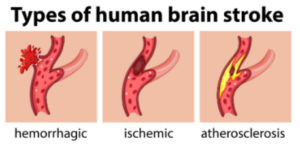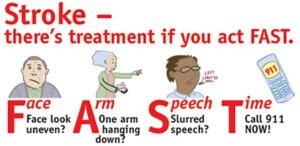
Is a stroke pretty much guaranteed once your blood pressure reaches a point higher than a specific number?
When the top number (systolic) is at least 140 and the bottom number (diastolic) is at least 90, this is considered high blood pressure (hypertension).
Depending on which doctor you speak to, you’ll be told that 130 is the cutoff point for pre-hypertension.
You may already know that high blood pressure is a major risk for a stroke.
Two Main Kinds of Stroke
• Ischemic
• Hemorrhagic
Ischemic stroke. A blood clot in a vessel in the brain blocks blood from getting past it, thereby preventing the area that the vessel feeds from getting oxygen.
This blood clot may arise in the brain or travel there from a piece of plaque breaking off in a carotid artery (neck) or originate from the heart.
Hemorrhagic stroke. A blood vessel in the brain ruptures or bursts, releasing blood onto brain tissue.

Source: vecteezy.com
How High Must Blood Pressure Get to Cause a Stroke?
“Unfortunately, there is no one number,” begins Susan L. Besser, MD, with Mercy Medical Center, Baltimore, and Diplomate American Board of Obesity Medicine and board certified by the American Board of Family Medicine.
Dr. Besser continues, “There are many variables in play. In fact, one can have a normal blood pressure and still have a stroke if they happen to have a blood clot in one of the blood vessels in the brain, or if they have an aneurysm (a weak point in a blood vessel) in the brain that suddenly tears and causes a brain bleed.
“Obviously, keeping all risk factors like diabetes, hypertension, heart disease, smoking and so on under control will reduce the risk of stroke and generally improve your health overall, but there really isn’t a specific number to be ‘on alert’ for.”

A very effective way to lower blood pressure or prevent high blood pressure is to eat many servings a day of fruits and vegetables – straight from the produce department in fresh form.
Along with that, adhere to avoiding other risk factors, and get plenty of aerobic and weight-bearing exercise.
At the same time, limit processed foods.
For example, a dish of strawberries, a banana, a few eggs and a glass of chilled plain kefir are far better for your cardiovascular system than are a bowl of corn flakes and an English muffin with jam.
 Dr. Besser provides comprehensive family care, treating common and acute primary conditions like diabetes and hypertension. Her ongoing approach allows her the opportunity to provide accurate and critical diagnoses of more complex conditions and disorders.
Dr. Besser provides comprehensive family care, treating common and acute primary conditions like diabetes and hypertension. Her ongoing approach allows her the opportunity to provide accurate and critical diagnoses of more complex conditions and disorders.
 Lorra Garrick has been covering medical, fitness and cybersecurity topics for many years, having written thousands of articles for print magazines and websites, including as a ghostwriter. She’s also a former ACE-certified personal trainer.
Lorra Garrick has been covering medical, fitness and cybersecurity topics for many years, having written thousands of articles for print magazines and websites, including as a ghostwriter. She’s also a former ACE-certified personal trainer.
.








































